CrystalDiskMark is free benchmark software. You can use this free benchmarking tool to perform a USB speed test. Easily bench test the speed of your local hard drives, removable external USB flash drives, as well as even networked drives. In addition the utility supports drive speed testing through customizable profiles and even offers a NVMe SSD test option.
You can save your benchmark results either to a text file or as an image. Another cool feature is the ability to use selectable themes. A zipped version is also offered by the author. The zip file contains stand alone executables for both 32 and 64bit systems. Which makes it a great portable benchmarking app that can be stored and then run entirely from USB flash drive, so you can take it with you.
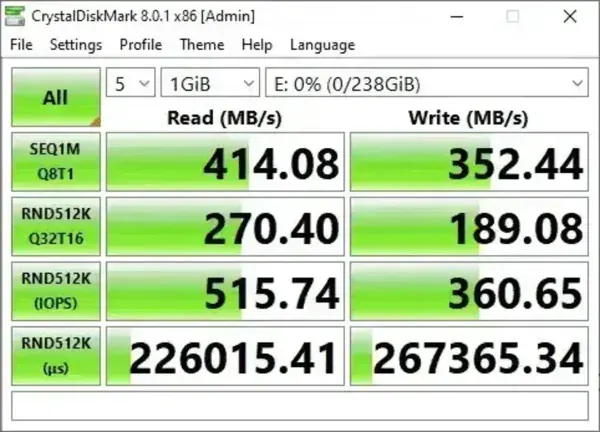
About CrystalDiskMark Free Benchmark Software
Amongst free benchmark software tools, I personally think this ranks as one of the best benchmark software for speed testing USB flash drives that one can find. Crystal Disk Mark is shown below running a quick benchmark USB drive speed test on a SanDisk Extreme Pro flash drive.
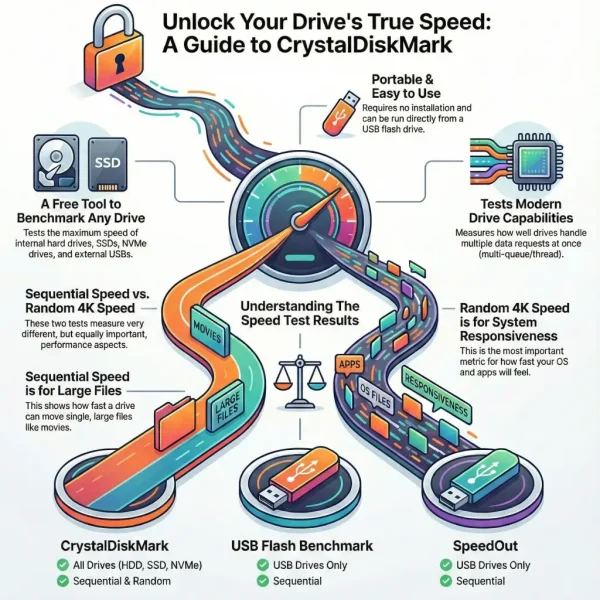
CrystalDiskMark benchmarking
🎙️ Transcript (click to expand)
Speaker 2: Welcome back. Today we are diving deep into, well, a really essential tool, I think. It's free, and it helps answer that question. Is my storage device actually fast? You know, you get that slick new NVMe drive, or maybe you're wondering about an old USB stick. How do you actually measure the performance? We're evaluating the benchmarking utility known as CrystalDiskMark. Go, let's unpack this.
Speaker 1: Right. Crystal Disk Mark, or CDM. It's pretty much the go-to utility for this. And its genius is really its simplicity, but also its capability. It's freeware. Totally free. And it's designed to test the maximum read and write speeds of basically every type of storage you can think of. You know, old hard drives, SATA SSDs, the fast NVMe ones, even external USB drives. It's been kept up to date for years by its author, Hayao Hiyo.
Speaker 2: And I think for anyone listening who maybe troubleshoots PCs or build systems, that accessibility is just fantastic. Freeware, OK, great. But the portable app part, that's a huge convenience factor.
Speaker 1: Oh, definitely. That portability is extremely useful. You can just download the zip file, right? Put it on a USB stick. then you can run the actual program, the executables, directly from that stick. Test storage on pretty much any modern Windows machine it supports, Windows 7 right up through Windows 11. No installation needed. Perfect if you're quickly checking a friend's PC or testing parts on a bench.
Speaker 2: Okay, so you run it, and the report shows these, well, these different kinds of speeds. Sequential and random. And I think this is where people sometimes get a bit confused. Why do we need both? I mean, if I just want my computer to feel snappy, why care about, say, moving one huge file versus lots of tiny little data chunks?
Speaker 1: Ah, yes. That's really the critical insight here. So the sequential test that measures how fast data moves when it's all in one big continuous block. Think about transferring, like, a massive video file, maybe 10 gigs. A high sequential number is good for that, for bulk storage tasks. But the real measure of how fast your system feels, that often comes down to the random tests, specifically the 4K random...
Speaker 2: test. 4K random, okay.
Speaker 1: Yeah, because system responsiveness, loading apps, browsing the web, multitasking, that stuff doesn't usually involve moving one giant file. It involves reading and writing thousands of tiny little four kilobyte data blocks all over the drive, often at the same time. So if your 4K or random score is low, your whole operating system can feel sluggish, even if the sequential speed looks amazing on paper.
Speaker 2: Right, okay, that makes sense. Now, CDM also gets a bit more advanced. It lets you test with multiple cues and threads. For someone just learning about this stuff, why bother with those settings? Is that just for, like, benchmark bragging rights?
Speaker 1: No, not at all, actually. It's really vital for properly testing modern SSDs, especially NVMe drives. See, a traditional SATA drive is kind of like a single-lane road. It handles requests mostly one after the other. But NVMe drives, they're built for parallel processing. Think of a superhighway, multiple lanes, which are like the threads, and they have areas where multiple requests can stack up waiting to be processed. Those are the queues. If CDM didn't test with multiple queues and threads, it just wouldn't show you the true potential of these modern drives. It'd bottleneck the test itself.
Speaker 2: Yeah. So the NVMe drive is like this multi-lane highway, and you need a test that can actually fill those lanes to see how fast it can really go. And then we get these four main numbers, right? Megabytes per second for sequential read-write and 4K random read-write. But let's step back, connect this to the bigger picture. We see a huge number, maybe 7,000 MB/s writes. Sequential read looks incredible. But you mentioned these are synthetic benchmarks. Yeah. So does that mean they're not, like, real? How much difference is there usually between the test number and, you know, my actual daily use?
Speaker 1: Well, synthetic means it's a simulation. It's designed to push the drive to its theoretical maximum under specific controlled conditions. It's standardized, repeatable, which is great for comparing different drives side by side, but it might not perfectly match what happens when you are, say, rendering a video while also having 50 browser tabs open and downloading a game. Your specific workload might be different. So yeah, the real world performance can vary. That discrepancy is the main thing to keep in mind.
Speaker 2: Okay. And it's worth pointing out, right, that CDM is laser focused on speed benchmarks. It's not checking for drive errors or monitoring its health in real time. You'd need other tools for that complete picture. And yeah, there are alternatives out there like HDBench or Speedout, but they're also mostly synthetic tests too, generally.
Speaker 1: Exactly. They serve a similar purpose, comparative speed testing.
Speaker 2: So what does this all mean for you, the listener? CrystalDiskMark is definitely powerful. It's free, it's pretty customizable if you want it to be. Great for a quick assessment of any drive. And using it is straightforward. Pick your drive, maybe tweak settings if you know what you're doing, or just hit the all button. Then look at those results, those MB/s numbers, especially focusing on the 4K random read and write if you want to know how fast the system will likely feel day to day.
Speaker 1: Right. And that brings up a final thought, maybe something for you to chew on. When you are looking at those four key numbers, sequential read, sequential write, 4K random read, 4K random write, and you're thinking about a specific use case, like should this drive be my main OS drive for maximum responsiveness, or is it better as just a big vault for storing media files? Which one of those four metrics do you think is the single most important speed to look at if your main goal is minimizing that feeling of system sluggishness and just maximizing your daily productivity?
This popular and widely used benchmarking software was created to test the performance of storage devices such as hard drives (HDDs) and solid-state drives (SSDs). It is primarily used to assess the read and write speeds of these storage devices, providing valuable insights into their overall performance.
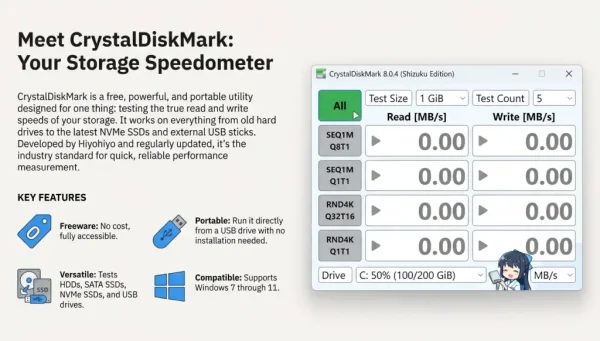
Features:
Features of this USB flash drive tester include:
- The application offers several types of speed tests, including sequential and random read/write tests. Sequential tests measure data transfer speeds when reading or writing large blocks of data sequentially, while random tests assess performance when reading or writing small, random data blocks.
- Supports testing with multiple queues and threads, allowing users to evaluate how well a storage device can handle multiple data requests simultaneously. This is particularly important for SSDs, which can excel in multitasking scenarios.
- Can be used to test various types of storage drives, including traditional hard disk drives (HDDs), SATA SSDs, NVMe SSDs, and external USB drives.
- The benchmark provides detailed results, including data transfer rates measured in megabytes per second (MB/s) for both sequential and random read/write operations. It often reports four different metrics for each test: sequential read, sequential write, 4K random read, and 4K random write.
- It is made available as a portable application, which means you can run it without needing to install it on your computer. This makes it convenient for testing storage devices on various systems without leaving any traces behind.
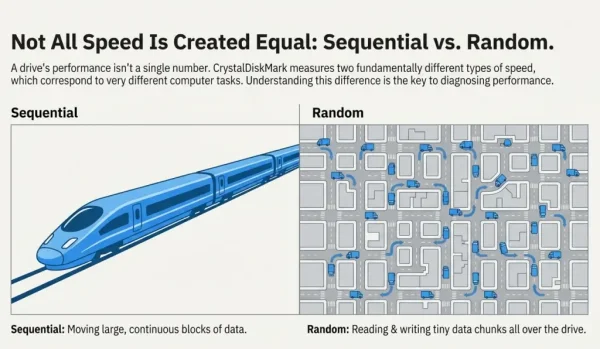
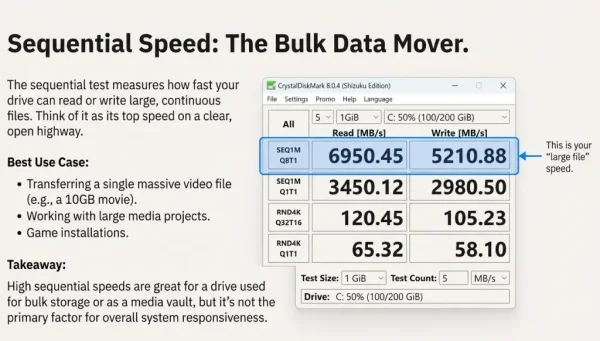
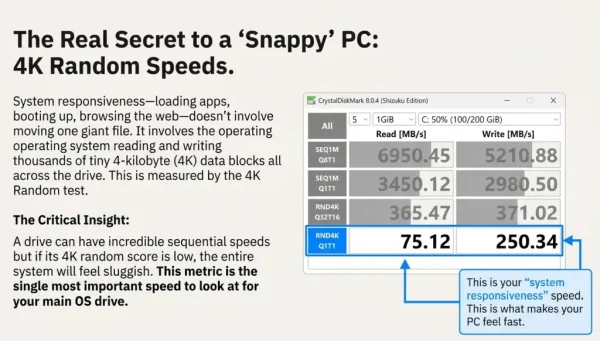
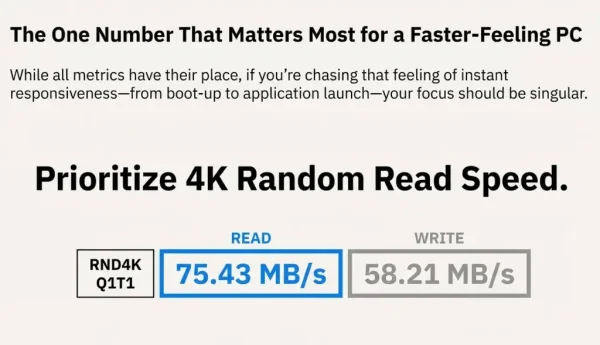
CrystalDiskMark much like Crystal Disk Info, is commonly used by hardware enthusiasts, IT professionals, and individuals who want to evaluate the performance of their storage devices. It can help users make informed decisions when purchasing new drives or assessing the health of existing ones.
Specifications and Download
- Authors Website: CDM Project Page
- Author: Created by Hiyohiyo
- Extracted File Size: +- 15 MB
- License: Freeware
- Operating System: Windows 11, 10, 8, 7
- Price Currency: USD
- Price: $0 Free
- Application Category: UtilitiesApplication, Benchmarking Software
- Editor's Rating: 5 Star
- Downloading: You can find this portable and free benchmark test software, here:
CrystalDiskMark Download
CrystalDiskMark Benchmarking Tool Review
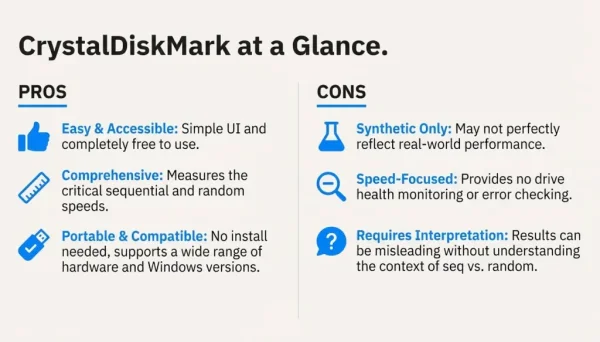
CrystalDiskMark is a well known benchmarking tool used to measure the performance of storage devices such as hard drives, SSDs, and USB drives. Here are some pros and cons I've found in using it:
Pros:
- Ease of Use: Simple and intuitive UI makes it easy for both beginners and advanced users to conduct USB stick benchmark tests.
- Free to Use: The tool is free to download and use, which makes it accessible for anyone needing to measure their storage device performance.
- Comprehensive Testing: It offers a range of tests that measure sequential and random read/write speeds, which are critical for evaluating the performance of storage devices.
- Customization: Users can customize test parameters such as test size, test count, and specific test types (sequential, random 4K, Q32T1, etc.).
- Wide Compatibility: Supports a variety of storage devices and interfaces, including SATA, NVMe, USB, and more.
- Regular Updates: The tool is regularly updated to improve functionality, add new features, and support the latest storage technologies.
Cons:
- Synthetic Benchmarks: The benchmarking utility provides synthetic benchmarks that may not always reflect real-world performance. Actual performance can vary based on workload and usage patterns.
- Limited System Insight: While it measures storage performance, it doesn't provide comprehensive insights into system health or other potential bottlenecks affecting performance.
- No Real Time Monitoring: The tool is designed for benchmarking rather than real time monitoring. It doesn't offer continuous performance tracking or diagnostics.
- Resource Intensive: Running benchmarks, especially with large test sizes and multiple iterations, can be resource-intensive and may temporarily affect system performance.
- Potential for Misinterpretation: Inexperienced users might misinterpret the results, leading to incorrect conclusions about the performance of their storage devices.
- No Error Checking: Doesn't perform error checking or report potential issues with the storage device, which could be important for diagnosing hardware problems.
Alternatives to CrystalDiskMark
Below is a list of alternatives to CrystalDiskMark, along with a comparison table to help you choose the right tool for your needs.
- USB Flash Benchmark: A portable tool specifically designed for speed testing USB flash drives, offering quick and detailed insights into read and write speeds.
- HDBench: An older yet reliable benchmarking tool that supports testing various hardware components, including storage devices.
- SpeedOut: A lightweight utility also focused on bench testing USB pen drives, offering quick speed tests.
Comparing The Alternatives
| Feature | CrystalDiskMark | USB Flash Benchmark | HDBench | SpeedOut |
|---|---|---|---|---|
| Type of Tests | Sequential, Random | Sequential | Comprehensive (Storage, CPU, GPU) | Sequential |
| Device Compatibility | HDD, SSD, USB, NVMe | USB | HDD, SSD, USB | USB |
| Customizable Parameters | Yes | No | No | No |
| Synthetic vs Real World Tests | Synthetic | Synthetic | Synthetic | Synthetic |
| System Resource Usage | Moderate | Low | Moderate | Low |
| Real Time Monitoring | No | No | No | No |
How to Use CrystalDiskMark
Using CrystalDiskMark is straightforward, even for beginners. Follow these simple steps to benchmark your storage device:
- Download and run the application: Use the portable version if you want to run it without installation.
- Select the target drive: Choose the storage device you want to test from the dropdown menu.
- Customize test settings (optional): Adjust test size, count, and types (sequential, random 4K, etc.) based on your needs.
- Start the benchmark: Click the "All" or specific test button to begin the speed tests.
- Review results: After the tests complete, view the read/write speeds displayed in MB/s.
- Save results (optional): Export the results as a text file or image for future reference.
Frequently Asked Questions
What is CrystalDiskMark?
A free benchmarking tool that tests the read and write speeds of storage devices such as HDDs, SSDs, USB flash drives, and NVMe drives.
Can CrystalDiskMark test USB flash drives?
Yes, it provides detailed speed test results for both sequential and random read/write operations on USB drives.
Is CrystalDiskMark portable?
Yes, it runs without installation, allowing you to use it directly from a USB flash drive.
Which operating systems does CrystalDiskMark support?
Windows 7, 8, 10, and 11.
What types of storage devices does CrystalDiskMark support?
Traditional hard drives (HDDs), SATA SSDs, NVMe SSDs, and external USB drives.
What kinds of tests does CrystalDiskMark perform?
Sequential and random read/write tests, including 4K random tests and multi-queue/thread benchmarks for advanced performance analysis.
Is CrystalDiskMark free to use?
Yes, it is freeware available for free download and use.
Where can I download CrystalDiskMark?
From the official project page: CrystalDiskMark Download
Are there alternatives to CrystalDiskMark?
Yes. Alternatives include USB Flash Benchmark, HDBench, and SpeedOut.
Closing Thoughts
CrystalDiskMark is an excellent tool for quick and easy benchmarking of storage devices (USB speed testing tool), providing valuable insights into a drive's performance capabilities. However, users should be aware of its limitations and consider it as part of a broader strategy for assessing and maintaining storage device overall condition, health and performance.
